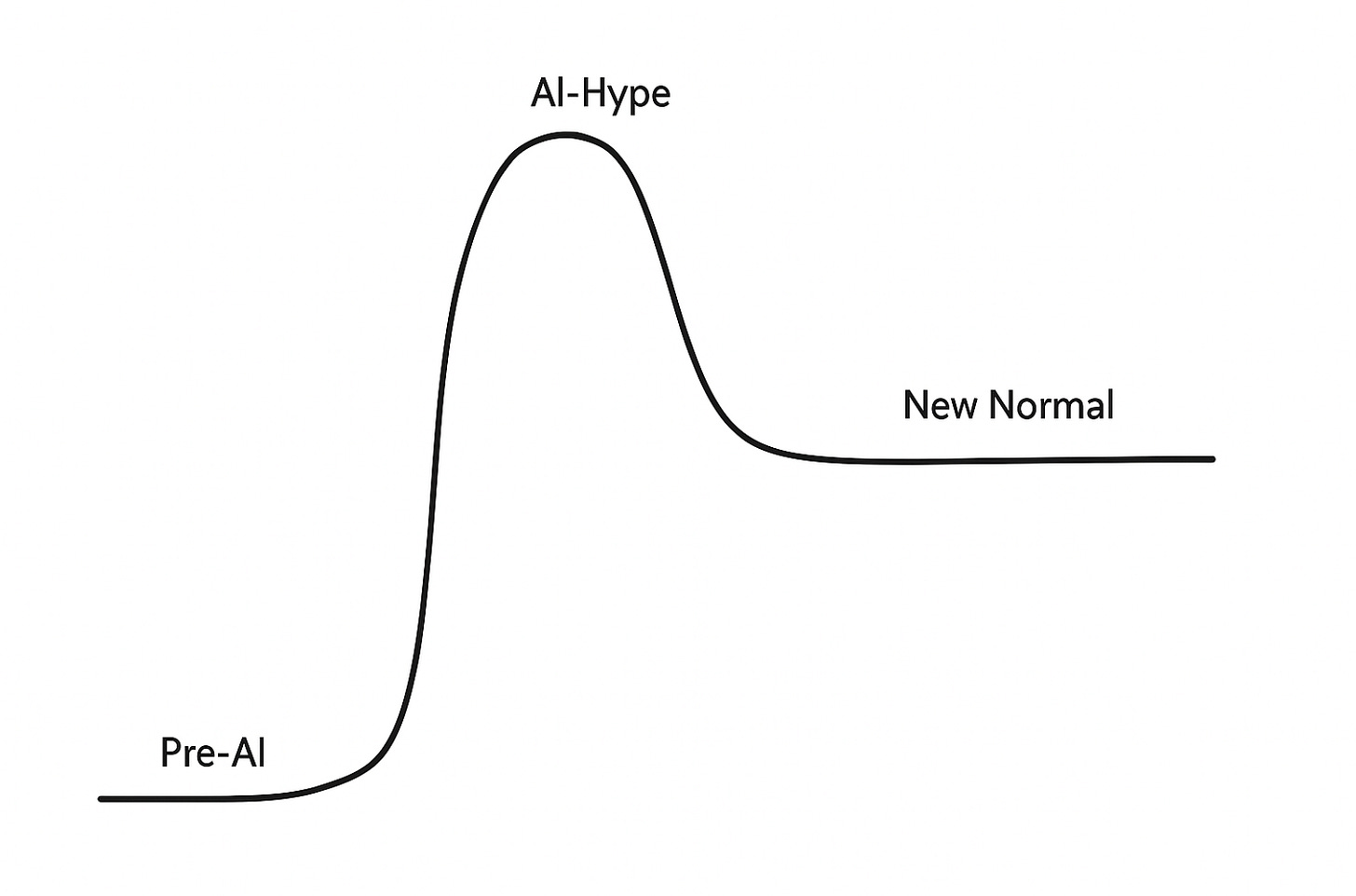19. AI is not an option
and how to get started without overwhelming yourself
I was recently in a conversation where someone asked, “Will we be compelled to use AI?” The phrasing stuck with me. It sounded like they were talking about seatbelts or taxes.
I don’t think using AI is an option anymore. Not in the sense of “something you can choose to ignore.” That window is closing fast — and in many ways, it’s already shut.
Imagine trying to do your job today without the internet. No email, no Google, no shared docs, no cloud apps. That’s what ignoring AI will feel like in a year or two. Possibly less.
Most technologies sneak up on you. They don’t feel important until they’re everywhere. AI feels important and is becoming omnipresent. That’s not hype — that’s a shift.
And yet, people still ask if they need to pay attention. Some are worried. Others are just unsure what to do.
Let me tell you what I tell them.
This isn’t about replacing your role. It’s about enhancing it.
But if you don’t enhance your role, there’s a good chance it will be replaced. Not necessarily by AI itself, but by someone who’s using it better than you are.
People tend to overestimate technologies when they’re at the peak of the hype cycle. Everyone assumes the world is about to flip upside down. But then something subtler happens.
The world does change — just not always in the way people imagined. And once it does, the new version becomes the default.
This already happened with remote work. Before pandemic, a five-day office job was the norm. Now it’s the exception. AI is headed the same way.
Every major company I know is rebuilding some part of how they work to accommodate AI. Some are building dedicated teams to experiment with AI.
You don’t have to understand how it all works. Most people use the internet every day without knowing how DNS or TCP/IP function. You don’t need to read the manual to benefit.
You just have to start using it.
I’ve written before about how product managers can use AI to work better
But AI isn’t just for technical roles.
That’s one of the biggest mental shifts people need to make. We’re used to tools that require specialised training. Figma is for designers. Excel is for analysts. Cursor is for engineers.
But your next internal tool might not be built by an engineer at all. It might be built by someone in ops who learned how to describe a problem well enough that an AI could build the skeleton of a solution.
You don’t need credentials to start using AI. You just need curiosity and ten minutes a day.
Where to get started?
If you’re feeling overwhelmed, I get it. A couple of months ago, I decided I needed to go deeper myself. I had no clue what’s happening. But I feel a tiny bit better now.
Last week I built an MCP server that speak with Jira.
I’ve also been experimenting by building ChatGPT wrappers, and have been rigorously using AI in day to day life.
There’s so much noise around AI that it can feel paralysing. Everyone’s launching something. Every tool claims to be revolutionary. It’s hard to know where to start.
Pick a task you do every week — something repetitive, something annoying, something that requires thinking but not creativity.
Then try to do it with AI. Build the habit of involving an LLM like ChatGPT in your everyday workflow. Use it as your brainstorm partner.
Even better: describe your workflow to an LLM and ask it how you can automate it. You’ll be surprised by how specific and helpful the answers are.
Now communicate better
This is also where prompt engineering comes in.
I don’t like the term. It makes it sound like something only experts can do. But it’s actually just: learn how to ask better questions.
People treat AI like Google and get disappointed when the results aren’t great.
But AI isn’t a better search engine. It’s a teammate.
A junior one — but a very fast, tireless, and always-available one.
Which means you have to treat it like a teammate. Give it clear instructions. Ask it to try different things. Review the output. Give it feedback. Iterate.
The more effort you put in, the more you get back.
For example, instead of saying "Write me a memo about hiring strategy" try something like
"You are an experienced Product Leader. I need you to write a clear, concise internal memo for our leadership team about our Q2 hiring strategy. The tone should be confident, strategic, and persuasive — not too formal, but professional. Use bullet points and tables where where necessary. The audience is time-starved executives, so make every sentence count. Include a strong opening, a summary of the current hiring funnel, 2-3 sharp recommendations, and potential risks. Avoid buzzwords and filler. Prioritize clarity and impact over style. Keep it under 500 words."
**Vocabulary and Word Choice:** Stick to **plain language**. Choose common, simple words over jargon or complex terminology. Imagine explaining the topic to an intelligent friend – use the kind of clear, straightforward words you would in conversation. If you must introduce a technical term or buzzword (because the topic requires it), briefly explain it or use it in a clarifying example. Avoid fluff and filler; every word should contribute to understanding the idea. The overall impression should be smart but unpretentious writing.
**Sentence Structure:** Favor simple, clear sentences. Vary sentence length to create a natural flow – use mostly short to medium-length sentences for clarity, and the occasional longer sentence to elaborate a complex idea. Ensure each sentence flows logically from the previous one, building the argument step by step. Avoid overly academic or convoluted sentences; it should feel like clear thinking put into clear words.
This kind of prompt doesn’t just ask for content — it sets the stage for the kind of output you want: who’s writing, who it’s for, how it should sound, and what to avoid.
The result wasn’t perfect, but it was 80% of the way there — and 10x faster than doing it myself from scratch.
The best part is that, you can ask your LLM to improve your prompts as well.
Learn to vibe code
AI is powerful on its own, but when you combine it with even basic coding skills, the possibilities multiply. Think of coding the way we think of math — not everyone needs to be a mathematician, but it helps if everyone can do arithmetic. The same will be true for code.
Start by downloading an AI-native IDE like Cursor or Windsurf. You don’t need to know how to code yet. Just try describing a simple app you’ve always wanted to build — maybe it’s a tool to track personal goals, or a script to clean up data, or a little dashboard to monitor your habits.
Then let the AI walk you through it.
You’ll be surprised how far you can get by just describing what you want clearly.
And if you get stuck? YouTube is full of walkthroughs, beginner tutorials, and builders just like you trying things out in public. The only prerequisite is willingness to experiment.
It’s never been easier to go from idea to working software — even if you’ve never written a line of code before.
If I have to think of a high level roadmap to learn AI starting from scratch, this is what I would do.
Start talking to AI first (Try different LLMs, play around and have fun)
Upgrade your prompt game - Use structured prompts, refine thoughts. Try things like Deep Research and how to use it for your workflows. Use AI as a brainstorming partner to refine ideas.
Explore tools - start building stuff, join communities and go where AI conversations are happening. Write a script or build real workflows to save you time and help others.
Once you immerse yourself in it a little, you will start seeing new applications and use cases.
And most importantly, share your learnings as you go. This will help you learn better.
Here’s the mindset shift I’d suggest:
Stop thinking of AI as a tool.
Start thinking of it as a coworker — one that’s weirdly smart in some ways and surprisingly dumb in others. But always getting better.
The world is not moving slowly here. AI won’t just become common — it will become expected if you are a knowledge worker.
Not using it isn’t falling behind.
It’s standing still while the world races ahead.
You don’t need to learn how the model works.
You don’t need to be a developer.
You just need to start.
There’s still time to become one of the people who’s good at this. But that window won’t stay open forever.
And soon, the question won’t be, “Do I have to use AI?”
It’ll be, “How did anyone work without it?”
If you liked what you read, please share it with others:




True, ignoring AI is no longer an option. However, blindly using it because it's a great productivity tool is also not an option. Only in my lifetime, we blindly accepted the internet, social media and smartphones and I'm uncertain if that's been a path to a better life. Don't only use it, try know as much as possible about AI and be critical of it so you can influence how it affects our lives.
A life well lived isn't a more productive one, it's a happier one. I wrote a post about this not so long ago. Maybe you're interested Sooraj:
https://open.substack.com/pub/writerbytechnicality/p/do-it-for-the-machines?r=3anz55&utm_campaign=post&utm_medium=web&showWelcomeOnShare=false
good stuff